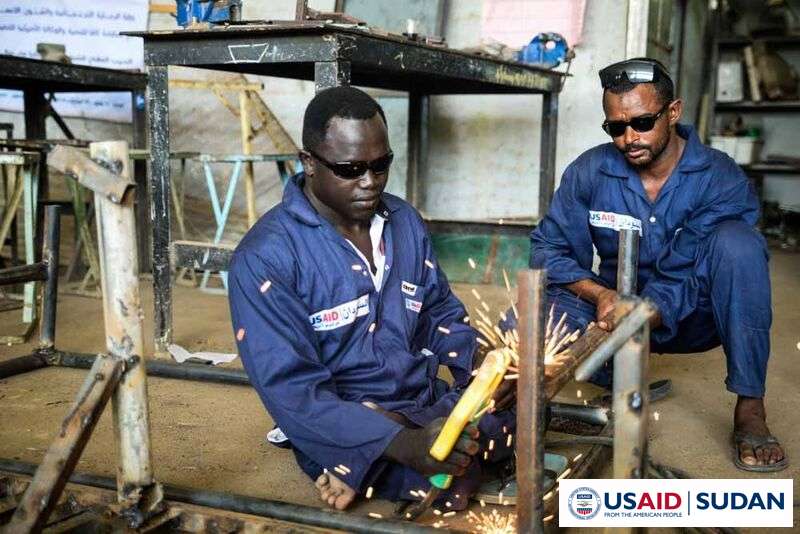
Persons with disabilities often face a myriad of challenges—from societal discrimination to limited employment opportunities. Each year, the UN’s International Day of Persons with Disabilities focuses on the empowerment and inclusion of persons with disabilities for equitable and sustainable development. To mark this day, DT Global is highlighting our work with youth with disabilities in Sudan.
Gamar Aldin Younis Elias is a 31-year old person with disabilities from the Giessan community in the Blue Nile State of Sudan, just south of Khartoum. In Giessan, Sudan’s protracted conflict has disproportionately affected the disabled community. In the aftermath of war and conflict, Giessan offers little to no opportunities for youth in general, let alone youth with disabilities like Gamar Aldin.
In 2007, Gamar Aldin left his family in Giessan to study and pursue better opportunities in Damazine, the capital of Blue Nile State. After graduation, he struggled to find consistent work opportunities in the capital. “When I first came to Damazine,” Gamar Aldin shared, “I expected to find a job, but soon lost hope when I struggled to acquire the skills to make money to run my own business. The message was loud and clear: there is no chance for a disabled person to make money.”
Among the most vulnerable in Sudan’s conflict zones are persons with disabilities—particularly disabled youth, who face limited access to employment opportunities. In addition to the challenges of growing up in a war-affected environment, disabled youth face cultural stigmas that reinforce alienation and discrimination. The fragile political and security environment further marginalizes this group by excluding them from community development, the transition processes, and other decision-making activities.
Despite these challenges, when they are empowered, disabled youth are able to play a constructive role in society and contribute to the economic, social, and political development of Sudan. To encourage this potential, USAID’s Toward Enduring Peace in Sudan (TEPS) project facilitates training opportunities for youth with disabilities that covers topics such as electricity, mechanics, and leather-making. Following classroom training, the youth are given on-the-job training to bolster their knowledge.
Gamar Aldin was one of the youth selected by USAID/TEPS, along with eight others, to receive vocational training on welding. Encouraged by this opportunity, he remarked that the trainings helped him both financially and psychologically, improving his overall outlook on life and the future.

Relying on the skills Gamar Aldin learned in the classroom training, he successfully helped repair over 2,000 desks and seats for school children in the area. Because of the conflict in Blue Nile State, families and children were fleeing to Damazine, creating a rapid influx of new students and a subsequent shortage of seating. USAID/TEPS and individuals like Gamar Aldin were able to help provide additional seating for 13 schools in the area through this job training partnership.
“I am very happy because everywhere I go I find appreciation from the students who couldn’t believe that we came to support them. Their happiness and smiles were priceless,” he recalled.
Following his training, Gamar Aldin found work as a welder and carpenter, in collaboration with a colleague he met through the training. He is using the money he is earning to build a hut and, hopefully, bring his family to live with him in the capital.